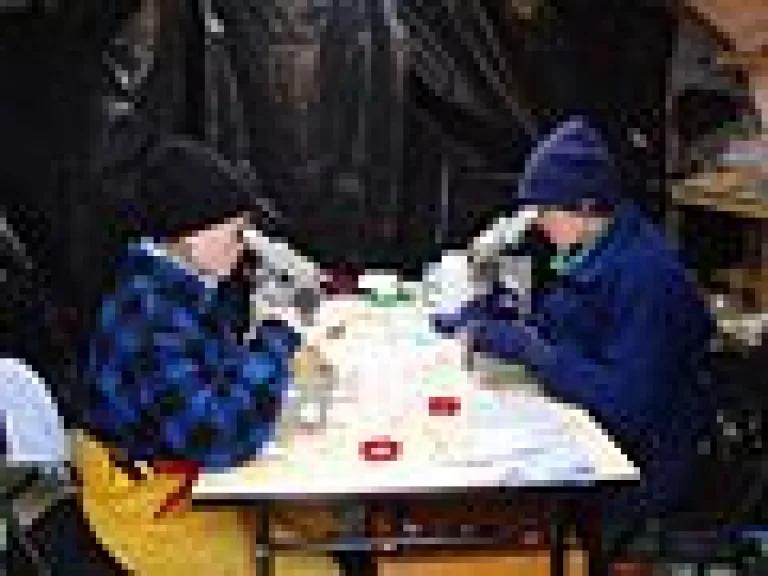Food safety inspections fade and Antarctic research freezes on Day 12 of the GOP's government shutdown

“I knew you were trouble when you walked in
Trouble, trouble, trouble
I knew you were trouble when you walked in
Trouble, trouble, trouble” -- “I Knew You Were Trouble” by Taylor Swift
The Tea Party certainly barged into Washington looking for the kind of trouble Taylor Swift sings of, and they’ve had no shortage of success in stirring it up. The most serious example is how this minority band in Congress threw our country into the ditch a dozen days ago by hitting the government shutdown button. As the machinery of government grinds to a near halt, the ripple effects through small businesses, communities and families grow stronger, more costly, more worrisome each passing day.
They’re not the Tea Party, they’re the Trouble Party.
Each day of their misguided shutdown, I’ve highlighted dangerous or disconcerting consequences they set into motion. Today, we’ll look both close to home and far from home, examining the role government plays in keeping the food on our table safe to eat, and vital research at the bottom of our planet now in jeopardy by the GOP-launched shutdown. It’s long past time for Republicans in Congress to do the job the Constitution requires them to do and pass a clean budget. Our government and country needs to get back to work, and our economy depends on it.
FDA food inspections dwindle
In the best of times, the U.S. Food and Drug Administration doesn’t inspect near enough seafood and fresh fruits and vegetables to ensure our food is really safe. Only about 2 percent of domestic and imported foods in those categories get lab tested for germs, illegal pesticides and dangerous substances. The U.S. Department of Agriculture tests far more of the meat and poultry raised in America and imported for one simple reason: a law specifically says it must be inspected.
Even so, FDA’s inspectors consistently turn up problems. Before the shutdown, FDA found salmonella, a nasty bacteria, and illegal drug residues in seafood. In produce, inspectors found salmonella and illegal pesticides. Listeria, which can cause serious and sometimes fatal infections in children, was identified through routine testing on packaged potato salad. But with shutdown, the food agency’s inspections have dwindled to a trickle.
FDA suspended routine establishment inspections and ongoing public health laboratory research. All inspections of imported foods have stopped. That’s a particular concern because the U.S. imports about 80 percent of the seafood and more than 20 percent of produce Americans eat. “The idea these inspections weren’t considered essential is pretty scary,” says Caroline Smith DeWaal, food safety director at the Center for Science in the Public Interest. “I’m very concerned about outbreaks and the lack of inspections.”
In fiscal 2011, FDA coordinated or inspected about 20,000 facilities and while the agency has said that state inspectors might pick up some of those inspections, its unknown how many will be examined during as the shutdown continues.
Antarctic research frozen as shutdown’s impact extends to the end of the Earth

In life, as on stage, timing is everything. So too in science: even though the length of the government shutdown will be measured in days or maybe weeks, it could wipe out an entire year’s worth of scientific research in Antarctica. That’s because the shutdown has come just as scientists are preparing to launch the research season during the South Pole spring and summer. The National Science Foundation said this week that without a new appropriation, money for the U.S. Antarctic Program would run out Tuesday, and is has already ordered contractors to start winding down operations by implementing “caretaker status for research stations, ships and other assets.” The fear: it may be impossible to restart some of the work once it’s halted.
"This is absurd, just absurd," Alan Leshner, chief executive officer of the American Association for the Advancement of Science, said in an Associated Press story. "It's a very big logistical enterprise and this could jeopardize the entire research season for hundreds of important projects." Equally gloomy, the NSF announcement warned, “Some activities cannot be restarted once seasonally-dependent windows for research and operations have passed, the seasonal workforce is released, science activities are curtailed and operations are reduced.” Besides the famous McMurdo Station, which can house up to 1,200 in the austral summer, the U.S. also has facilities at the South Pole and on the Antarctic Peninsula, where researchers study biology, astronomy, glaciers, particle physics and climatology. The NSF said U.S. facilities “will be staffed at a minimal level to ensure human safety and preserve government property.” In other words, apparently, not only will work stop, but many scientists and others already in Antarctica may have to leave.
A computer expert based at McMurdo, Richard Jeong, has organized an online petition to Congress seeking to keep the work going. http://www.change.org/petitions/congress-shutdown-exemption-for-the-united-states-antarctic-program The petition argues the prospective shuttering of the research stations “is squandering the long-term investment we have made in Antarctica….[Loss of] a single season can have long term international, scientific, and logistical repercussions which will take years of groundwork to reconstruct.”
Read my previous blogs about the shutdown here: http://switchboard.nrdc.org/blogs/sslesinger/
photo credits: wikimedia commons; FDA.gov.
